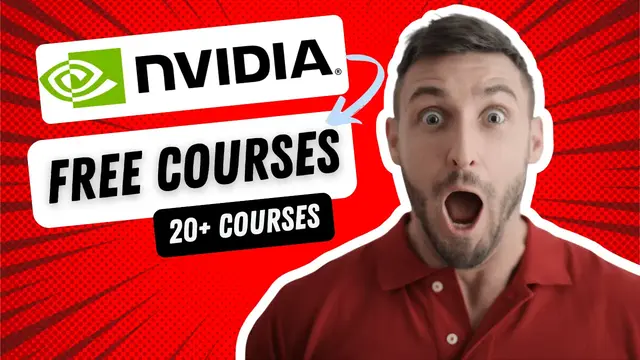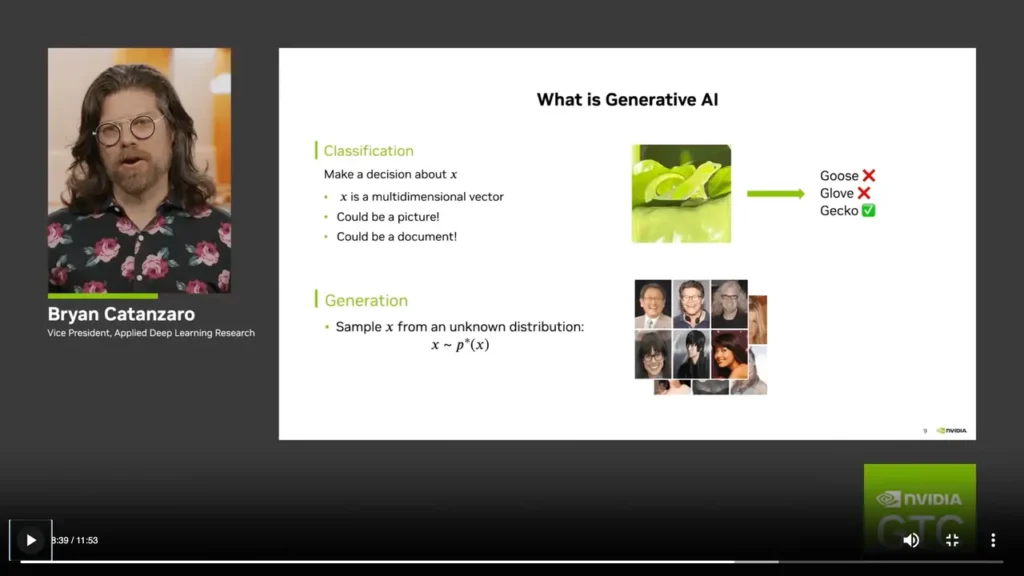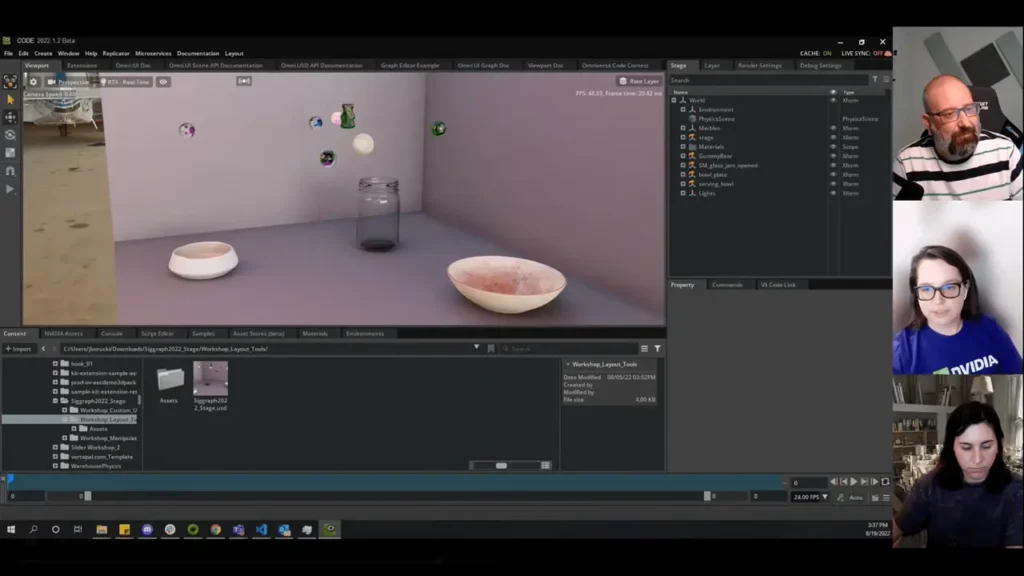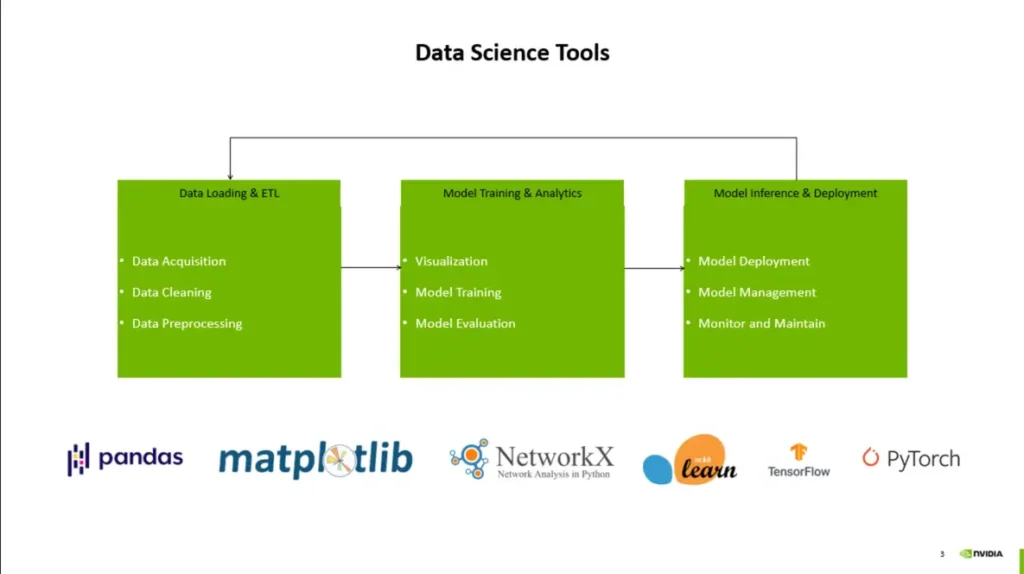Coursera Plus - Get Unlimited Access to 7,000+ Online Courses
Coursera Plus - Get Unlimited Access to 7,000+ Online Courses
Coursera Plus - Get Unlimited Access to 7,000+ Online Courses
20+ Nvidia Free Courses on AI, DL, Computing & More
Disclaimer: This post is NOT sponsored. Some product links are affiliate links which means if you buy through those links, you won’t pay anything extra and we’ll also receive a small commission on a purchase.

Are you interested in artificial intelligence, deep learning, and accelerated computing?
Then look no further than NVIDIA’s free tech learning resources.
NVIDIA’s DLI offers free courses that can equip you with the skills you need to succeed in these exciting fields.
Whether you’re a complete beginner or a seasoned developer, there’s a course for you.
In this guide, we’ll look into NVIDIA free courses available through DLI and how they can help you learn about different tech things.
20+ Nvidia Free Courses on DLI
1. Developing an Omniverse Kit-Based Application
NVIDIA Omniverse is for developing apps for 3D and industrial digitalization workflows.
To help you get started, NVIDIA provides free templates and the Omniverse Kit SDK.
The fundamentals of using Kit SDK to create applications are covered in this course.
You will be able to access the kit-app-template on GitHub by the end of the course. Additionally, you will learn how to develop an application and add extensions to personalize it using Kit SDK templates.
2. Generative AI Explained
In this Nvidia generative ai course, you will learn the underlying concepts and uses of generative artificial intelligence in this course. Additionally, you are going to explore the difficulties and prospects in the generative AI field.

Nvidia offers many more resources to learn about AI. One among them is NVIDIA AI Essentials Learning Series. You can also get some Nvidia free AI courses in this series.
3. Introduction to CUDA
In this course, you will learn how to write basic CUDA programs that run on NVIDIA GPUs.
By the end, you will know how to run many tasks at once on an NVIDIA GPU, organize these tasks for big data sets, handle memory between the CPU and GPU, and check your CUDA code to see how well it performs.
4. Assemble a Simple Robot in Isaac Sim
By the end of this course, you will know about Isaac Sim interface and have the knowledge needed to start your own robot simulation projects.
In this course, you’ll learn how to connect a local streaming client to an Omniverse Isaac Sim server in the cloud, load a mock robot into the Isaac Sim environment, add joint drives and properties to the robot body, add articulations to the robot and a lot more.
5. Building Video AI Applications at the Edge on Jetson Nano
The NVIDIA Jetson Nano Developer Kit is a user-friendly, powerful computer that can run multiple neural networks at once, making it perfect for learning intelligent video analytics (IVA) with the NVIDIA DeepStream SDK.
In this 8 hours course, you’ll use JupyterLab notebooks and Python on Jetson Nano to create projects that analyze video streams with deep learning. You’ll learn techniques that you can use for your own future projects on the Nano or other Jetson platforms.
6. Build Beautiful, Custom UI for 3D Tools on NVIDIA Omniverse
In this course, you’ll learn to create custom UI’s for Omniverse workflows with hands-on exercises.
You can become a UI master by diving into NVIDIA Omniverse Kit’s powerful omni.ui tools and frameworks by taking this course.
7. Building A Brain in 10 Minutes
In this 10 minutes course, you’ll get to know the biological and psychological inspirations to the world’s first neural networks.
By the end, you’ll understand how neural networks use data to learn and the math behind a neuron.
8. Easily Develop Advanced 3D Layout Tools on NVIDIA Omniverse
You’ll experience NVIDIA Omniverse firsthand, the platform designed for creating accurate 3D virtual environments.
You will learn how simple it is to develop custom scene layout tools in Omniverse Code using minimal Python scripting. This 2 hours course will guide you through building your own custom scene layout with practical exercises in Omniverse Code and Python.

9. Develop, Customize, and Publish in Omniverse With Extensions
If you want to change how Omniverse works and looks, you can learn about it in this 8 hours course.
Here you’ll learn to use extensions that let you do many things, like spawning objects with a button or adding custom physics to objects. You will also learn to optimize your workflow by turning common tasks into an extension.
10. Getting Started with DOCA Flow
In this course, you will learn about DOCA Flow programming by creating an “ARP Storm Control” application.
By the end of this course, you will understand DOCA Flow’s role within DOCA and DPUs, how to build an offloaded Virtual Network Function (VNF) application, and how to speed up a networking application using the DPU’s embedded switch.
11. Disaster Risk Monitoring Using Satellite Imagery
In this course, you will learn how to create a machine learning workflow for managing disasters, using tools to process big satellite images.
You’ll also learn to build cost-effective deep learning models, deploy them for quick analysis, and use these models to detect and respond to floods.
12. How to Build Custom 3D Scene Manipulator Tools on NVIDIA Omniverse
In this course, you’ll learn from the Omniverse developer team how to improve and extend the 3D tools you already use.
Through hands-on exercises, you’ll create your own custom scene tools in Omniverse using just a few lines of Python code.
13. Getting Started with AI on Jetson Nano
In this course, you’ll learn how to set up your NVIDIA Jetson Nano and camera, collect and label image data, and train a neural network to create your own models. You’ll also learn how to run these models on the Jetson Nano.
By the end, you’ll be able to make your own deep learning classification and regression models with the Jetson Nano.
14. Sensitive Information Detection with Morpheus
In this short course, you will learn about detecting sensitive information with the help of AI based framework called NVIDIA Morpheus which is known for creating cybersecurity solutions.
15. Getting Started with USD for Collaborative 3D Workflows
In this 4 hours Universal Scene Description (OpenUSD) framework related course, you’ll learn how to create scenes using easy-to-read Universal Scene Description ASCII (.USDA) files.
By the end, you’ll be able to make your own scenes within the USD framework.
You’ll also have a strong foundation to use USD in applications like Omniverse, Maya, Unity, and Unreal Engine.
16. Introduction to DOCA for DPUs
In this course, you’ll learn the basics of DOCA and DPUs.
You’ll understand DOCA as a platform for accelerated computing on DPUs, explore its framework, and study the capabilities of BlueField DPUs.
By the end, you’ll have the foundational knowledge to start developing applications that leverage DOCA and DPUs to enhance your data center’s performance.
17. Accelerate Data Science Workflows with Zero Code Changes
In this course, you’ll learn to use RAPIDS to make your data science workflows faster.
You’ll see the benefits of a unified workflow across CPUs and GPUs, and how to speed up data processing and machine learning without changing any code.

By the end, you’ll experience how much quicker your tasks can be with GPU acceleration.
18. Fundamentals of Working with OpenUSD
In this beginner level course, you’ll learn the basics of working with Universal Scene Description (OpenUSD) for 3D worlds.
You’ll discover how to use USD for non-destructive workflows, quickly compose scenes with layers, and separate and reuse data to speed up 3D workflows.
By the end, you’ll know how to apply USD in industrial use cases.
19. Introduction to Physics-informed Machine Learning with Modulus
By the end of this hands-on workshop, you’ll grasp the foundational elements of Modulus and the principles of physics-informed deep learning.
You’ll gain practical experience using the Modulus API to tackle data-driven and physics-based challenges, applying its techniques across various problems from deep learning to multi-physics simulation modeling within the Omniverse platform.
20. How to Build OpenUSD Applications for Industrial Digital Twins
In this course, you’ll dive into the Omniverse development platform basics, focusing on creating 3D applications and tools tailored for industrial needs.
You will also learn to build solutions that support gathering and analyzing large-scale facilities like factories and warehouses efficiently.
21. Augment your LLM Using Retrieval Augmented Generation
In this course, you’ll grasp the fundamentals of Retrieval Augmented Generation (RAG), a technique introduced by Facebook AI Research.
You’ll explore how RAG enhances large language models by integrating dynamic data retrieval without needing model retraining.
You will see and learn from NVIDIA’s approach, which includes understanding the RAG retrieval process and components of their AI Foundations for building effective RAG models.
22. Building RAG Agents with LLMs
This course teaches you how to deploy an agent system powered by large language models (LLMs) that offers great retrieval capability for using tools, looking at documents, and plan their approaches.
You can also learn about advanced orchestration techniques that include internal reasoning, dialog management, and effective tooling strategies.
Nvidia Free Courses on Coursera
The following three courses are offered by Nvidia through Coursera. You can access the course materials for free of cost by choosing the “Audit only” option while enrolling in these courses.
- AI Infrastructure and Operations Fundamentals
- Introduction to Networking
- The Fundamentals of RDMA Programming
You can purchase the courses individually or take Coursera Plus subscription if you want to receive a course completion certificate for these 3 courses.
Final Words
Thats it. We have seen all the Nvidia free courses available online.
Think about what you want to learn and pick a relevant course from this list of tech courses given above.
All these are self-paced courses. You can enroll and learn whenever you have time.
So, go ahead, take a Nvidia free course course and upgrade your tech skills.